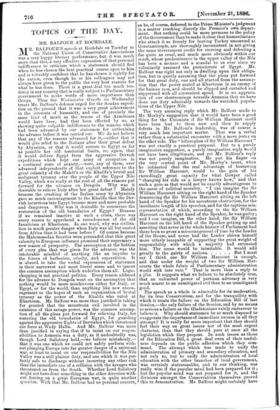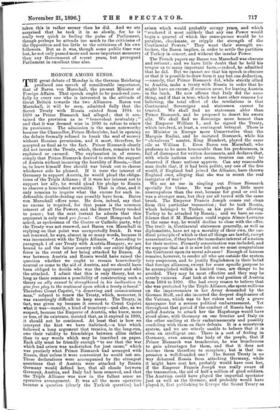TOPICS OF THE DAY.
MR. BALFOUR AT ROCHDALE.
MR. BALFOUR'S speech at Rochdale on Tuesday to the National Union of Conservative Associations was a very happy literary performance, but it was much more than this, a very effective expression of that personal indifference to criticism which a statesman should feel when he has chosen the best practical course open to him and is tolerably confident that he has chosen it rightly for the nation, even though he or his colleagues may not always have given to the public the very best reasons for what he has done. There is a great deal too much ten- dency in any country that is really subject to Parliamentary government to make words of more importance than things. Thus the Westminster Gazette on Wednesday treats Mr. Balfour's defence urged for the Soudan expedi- tion on the ground that it was a very great achievement in the interests of humanity, and one of precisely the same kind of merit as the rescue of the Armenians would have beer, had that been effected by us, as showing quite culpable indifference to the reasons which had been advanced by our statesmen for authorising the advance before it was carried out. We do not believe that any of the reasons advanced for it,—either that it would give relief to the Italians after their great defeat by Abyssinia, or that it would restore to Egypt as far as possible her old territorial limits, or, again, that it would deliver Egypt from the aggressive Dervish expeditions which kept our army of occupation in a continual state of anxiety,—were, any of them, ever advanced independently of that explicit reference to the great calamity of the Mandi's or the Khalifa's brutal and malignant tyranny over the people of the Upper Nile Valley, which was really at the root of all the reasons put forward for the advance on Dongola. Why was it desirable to relieve Italy after her great defeat ? Mainly because the crushing of the Italian army by Abyssinia gave so much encouragement to the Khalifs that the Der- vish incursions into Egypt became more and more probable and dangerous. Why was it desirable to commence the restoration of the old boundaries of Egypt ? Because if we remained inactive at such a crisis, there was every reason to apprehend a recrudescence of the old fanaticism at Khartoum. In one word, why was civilisa- tion in much greater danger when Italy was all but ousted from Africa than it had been before ? Of course because the Mahommedan fanatics were persuaded that this great calamity to European influence promised their supremacy a new season of prosperity. The assumption at the bottom of every plea that was given for the advance, was the intolerable mischief of anything like an impulse to the forces of barbarism, cruelty, and superstition. It is absurd to take the verbal expressions of statesmen in their narrowest and most literal sense and to ignore the common assumption which underlies them all. Logic- chopping is not practical politics. Every reason adduced for the advance to Dongola went on the assumption that nothing would be more mischievous either for Italy, or Egypt, or for the world, than anything like new encou- ragement to the hopes of such an organisation of brutal tyranny as the power of the Khalifa who ruled at Khartoum. Mr. Balfour was more than justified in taking for granted that the monstrous evil involved in the existence of this savage power, was the common assump- tion of all the pleas put forward for relieving Italy, for restoring the old boundaries of Egypt, for guarding against the aggressive flights of Dervishes which threatened our force at Wady Haifa. And Mr. Balfour was more than justified in saying that if to insist on our respon- sibilities to Armenia was a duty, as it undoubtedly was, though Lord Salisbury held,—we believe mistakenly,— that it was one which we could net safely perform with- out plunging Europe into far greater danger of a universal war, at least to insist on our responsibilities for the Nile Valley was a still plainer duty, and one which it was per- fectly safe to discharge without incurring any other risk than the immediate one of a collision with the savages who threatened us from the South. Whether Lord Salisbury might not have done something in the other direction with- out forcing on a great European war, is quite another question. With that Mr. Balfour had no personal concern, as he, of course, deferred to the Prime Minister's judgment in a matter touching directly the Premier's own depart- ment. But nothing could be more germane to the policy of the Government than to make it clear that humanitarians who attack it so fiercely for leaving Turkey uncoerced at Constantinople, are thoroughly inconsistent in not giving the same Government credit for coercing and defeating a foe quite as cruel, and much more obviously within our reach, whose predominance in the upper valley of the Nile has been a menace and a scandal to us ever since we voluntarily assumed the protectorate of Egypt. Mr. Balfour was right not only in dwelling upon this obliga.. tion, but in quietly assuming that the pleas put forward for that great duty, one and all started from the assump- tion that the power seated at Khartoum is an enemy of the human race, and should be clipped and curtailed and suppressed with all convenient speed. It is no aggrava- tion of our shortcomings towards Armenia that we have done our duty admirably towards the wretched popula- tions of the Upper Nile.
The very amusing reply which Mr. Balfour made to Mr. Morley's suggestion that it would have been a good thing for the Unionists if Sir William Harcourt could have been lent to them now and then to supply defects in Mr. Balfour's leadership, was of course a very much less important matter. That was a verbal rather than a substantial encounter with a mere jester on the other side. The " bifurcation of Sir William Harcourt " was not exactly a practical proposal. But to a purely imaginative suggestion, a purely imaginative reply would not have been illegitimate, and yet Mr. Balfour's reply was not purely imaginative. He put his finger on the very central point of Mr. Morley's taunt, when he intimated that the real advantage of borrowing Sir William Harcourt, would be the gain of his exceedingly great capacity for what Cowper called " changing his side as a lawyer knows how," and that such a gain as that would not be exactly advantageous to the cause of political morality. "I can imagine the Sir William Harcourt sitting on the right hand of the Speaker denouncing the Sir William Harcourt sitting on the left hand of the Speaker for his monstrous obstruction, for the inordinate length of his speeches, and for the captious mis- representation of which, according to the Sir William Harcourt on the right hand of the Speaker, he was guilty ; and I can imagine, on the other hand, the Sir William Harcourt on the left hand of the Speaker getting up and asserting that never in the whole history of Parliament had there been so gross a mismanagement of time by the Leader of the House, and never had the Leader shown himself more utterly incapable of supporting the great weight of responsibility with which a majority had entrusted him. The scene would be inimitable. It would add greatly to the gaiety of nations But I must say I think one Sir William Harcourt is enough, and that under the weight of two Sir William Har- courts the whole fabric of Parliamentary administration would sink into ruin " That is more than a reply to a jibe. It suggests what we believe to be absolutely true, that an unlimited power of partisan advocacy is very much nearer to an unmitigated evil than to an unmitigated good.
The speech as a whole is admirable for its moderation, for its true Conservatism, and for the tranquillity with which it treats the failure on the Education Bill of last Session,—the only failure of the Session, and by no meting so serious a failure as the Gladstonians vainly endeavour to believe it. Why should statesmen be so much disposed to exaggerate the importance of immediate success in all they attempt? It is really far more important that they should feel their way on great issues not of the most urgent character, than that they should pass at once all the legislation which they propose. In such issues as those of the Education Bill, a great deal even of their useful- ness depends on the public adhesion which they com- mand. The attempt which was made to unify the administration of primary and secondary education, and not only so, but to unify the administration of local education with the other branches of local government, was certainly statesmanlike, and to our thinking, was really wise if the popular mind had been prepared for it ; but the popular mind was not prepared for it, and the divisions amongst the Conservatives themselves proved this to demonstration. Mr. Balfour might certainly have taken this in rather sooner than he did. And we are surprised that he took it in so slowly, for be is really very quick in feeling the pulse of Parliament, though perhaps he attends too much to the criticisms of the Opposition and too little to the criticisms of his own followers. But as it was, though some public time was lost, he not only passed more and more important measures than any Government of recent years, but prorogued Parliament in excellent time also.























































 Previous page
Previous page